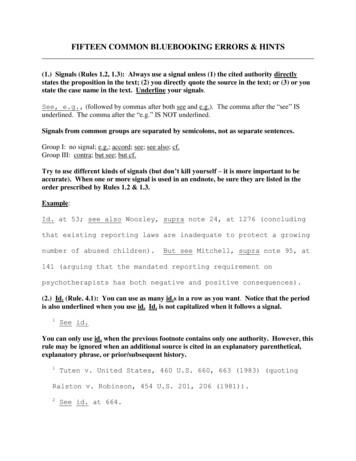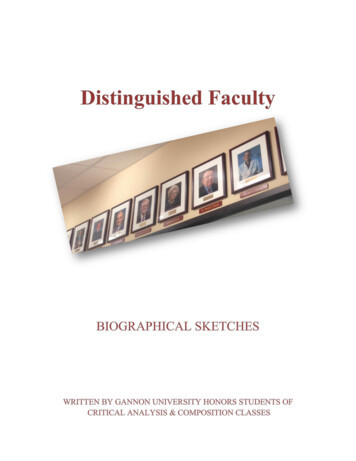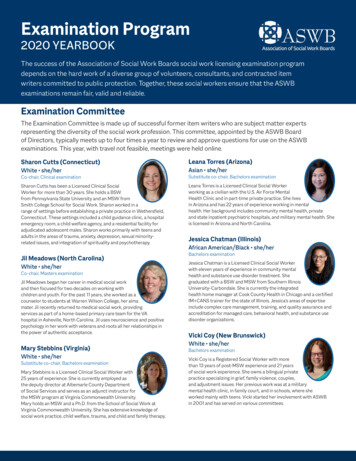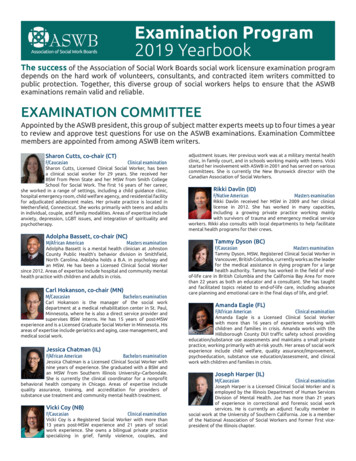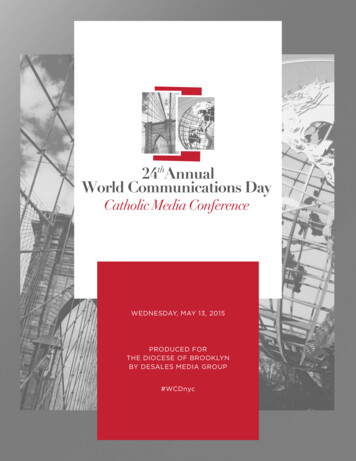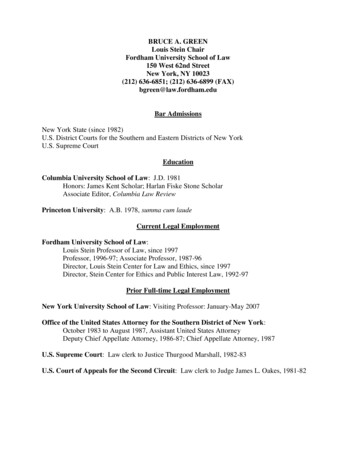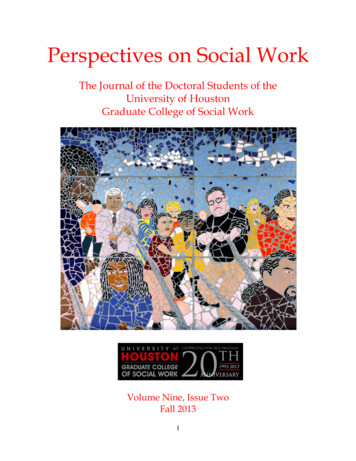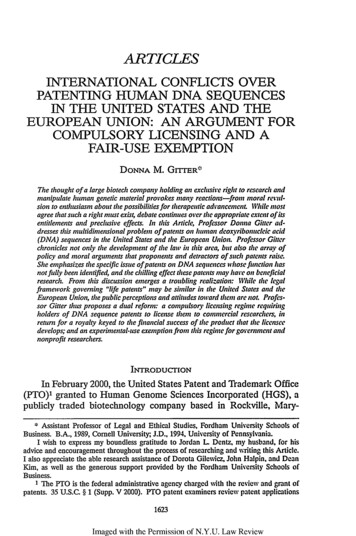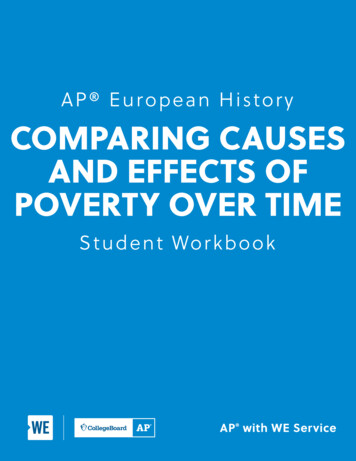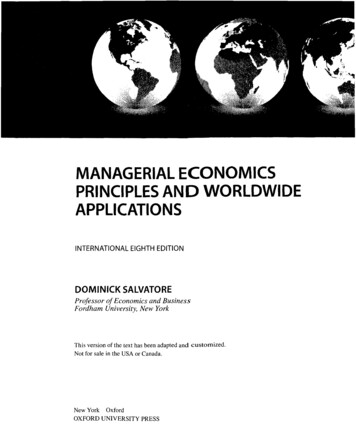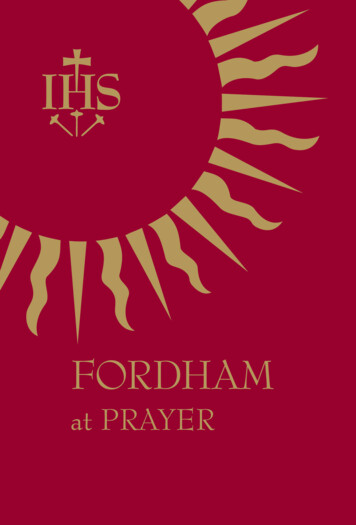
Transcription
FORDHAMat PRAYER
CHAPELS AND PRAYER RO OMS AT FORDHAMRose HillUniversity ChurchOur Lady’s Chapel (University Church, lower level)Sacred Heart Chapel (Dealy Hall, first floor)St. Robert Bellarmine, S.J., Chapel (Spellman Hall, first floor)Keating Blue Chapel (Keating Hall, third floor)St. Ignatius Chapel (Loyola Hall, first floor)Muslim Prayer Room (Faber Hall, first floor)Lincoln CenterFORDHAMat PRAYERBlessed Rupert Mayer, S.J., Chapel (Lowenstein, Room 221)WestchesterBlessed Miguel Pro, S.J., Chapel[Additional interfaith prayer spaces arebeing planned for all three campuses.]FAITH ORGANIZ ATIONS AT FORDHAMJewish Student OrganizationKnights of ColumbusMuslim Student AssociationOrthodox Christian FellowshipRespect for LifeSt. Elizabeth Ann Seton SocietySt. Robert Bellarmine SocietyThe Ignatian Society of Fordham UniversityUnited Christian FellowshipPrayers and Reflectionsfor Our Community
“In solitude, find in this book of prayer an invitation tocontemplation. In anxiety and concern, find consolation.In celebration, find your thoughts returned to God,the source of all being, the giver of every gift.”eDear Friends,Generations have made Fordham University their home. Here,minds have been nourished to maturity on rich intellectual fare, justas souls have been enlightened in the knowledge and love of theirCreator. This University is at once a spiritual and an intellectualhome. For this reason, Fordham has always been a place of prayer.As members of the Fordham family, we aim to be men andwomen of generous service and self-giving love. Prayer helpsmake this possible. The words we say in prayer and the spiritualpractices we take up are intended to carry us toward a personalencounter with God. This sacred encounter stirs emotions, opens upunimagined vistas, and enables us to recognize who we are: createdbeings whose life is a gift bestowed and sustained by the One whomwe meet in prayer.The logic of prayer is this: it transforms us into agents ofGod’s creative power; it makes us recognize that we share in God’songoing work today. Undertaken with regularity and sincerity,prayer ultimately compels us to live in gratitude and give fully ofour selves.We are an enormous family, but Fordham is a spiritual homewhere we come to know God one soul at a time. Throughout andbeyond the sacred journey of your life at this University, I urge youto use this book as a source of spiritual sustenance.Joseph M. McShane, S.J.President, Fordham University
TABLE OF CONTENTSChapels and Prayer Rooms at Fordham inside front coverCHAPTER 1Why Do We Pray? How? Where? When? 6CHAPTER 2St. Ignatius, Ignatian Spirituality, and Jesuit Education at Fordham 22CHAPTER 3Prayers, Poems, and Reflections in the Ignatian Tradition 28CHAPTER 4Prayers, Poems, Reflections—Catholic and Christian 48CHAPTER 5Prayers and Wisdom from Various Spiritual Traditions 60CHAPTER 6Prayers for College Life 66CHAPTER 7Prayers for Life after Graduation 74Fordham University Mission Statement 84Significant Jesuit Feasts and Memorial Days 86Sources and Acknowledgments 89
CHAPTER 1Why Do We Pray?How? Where?When?After harnessing space, the winds,the tides, and gravitation, we shallharness for God the energies oflove. And on that day, for thesecond time in the history of theworld, we shall have discovered fire.Pierre Teilhard de Chardin, S.J.Statue of Archbishop John J. Hughes,Founder of Fordham University
Humans,by their nature,are spiritual beings.Prayer gives voice to ourtranscendence and thereby affirmsthat we are more than just materialbeings.The biblical creation story tells usthat God “breathed life” into humans(Genesis 2:7).That breath of life is our spiritualnature; it is the basis of an intimatesharing between God and us.
When we pray,we acknowledgeand exerciseour spiritual nature.We articulate our most profoundhopes and discover our inmostlongings.In the process, we become morecompletely aware of who we are.In prayer, we explore our intimacywith God, and we enlivenour capacity to see ourselvescompletely—as a body, mind, andsoul that each permeate one anotherand make us into a whole person.
In prayer,we can also discernwhat we are capableof becoming.Prayer has the capacity to openour eyes to our limitations andfaults, to enable us to realize ourtalents and potentials, to give usthe resolve to freely choose whatGod wants from us.When we pray in a spirit ofhonesty and openness, we cansee ourselves as God sees us—as a beloved creation called toreflect the divine life breathedinto us.
We pray with others,and we pray alone.We pray at Mass and in smallcommunities of friends.We do this because we livetogether and are responsibleto one another.We do it because our communalprayer—expressed in song, inwords, in gestures, in silence—both affirms our shared spiritualnature and articulates ourcollective aspirations.
We also praytogether becauseour communal prayergives rise to ourpersonal prayer.Praying together stirs our senseof God’s presence around us andwithin us, and it provides essentialseeds for ongoing reflection andcontemplation.When we pray alone, we cultivatethose seeds and nurture them intospiritual fruit that sustains us andenables us to return to communalprayer with ever more maturespiritual gifts.
We pray in holy places.The artistic, architectural, and musical beauty we encounterin the University Church or Our Lady’s Chapel or the Churchof St. Paul the Apostle, along with the chapels in Dealy, Keating,Loyola, and Spellman Halls, echoes the transcendent beauty andgrandeur of God. In these locations, we feel that we are in God’spresence.When we set aside time with God in the Blessed RupertMeyer, S.J., Chapel at the Lincoln Center campus or the BlessedMiguel Pro, S.J., Chapel on the Westchester campus or in theMuslim Prayer Room in Faber Hall at Rose Hill, we are trainingourselves to be more fully aware that God is also outside thesesacred spaces. Locations that are consecrated for our communaland personal prayer become portals to a world where God isconstantly, dynamically present.Therefore, we also pray in places where holiness is notalways evident. We pray in our residence hall rooms andoffices. We pray on Edwards Parade and Lowenstein Plaza.We pray on the Ram Van and along the path from the cafeteriato the library. We also pray in our classrooms, study carrels,laboratories, practice rooms, and studios, and on our stages andplaying fields. We pray when we study abroad and on our servicetrips. We pray when we are on campus and off.When we undertake a life of prayer,prayer takes hold of our liveswherever we are.18WHY DO WE PRAY? HOW? WHERE? WHEN?
We pray in times of need and confusion,in moments of happiness and gratitude.We pray in the face of sorrow and betrayal, as well asreconciliation and forgiveness. Exaltation calls us to prayer, andso too does desolation. We pray in solitude and loneliness, justas we do in our regular gatherings and shared celebrations.We pray most of all in the in-between times that make upthe bulk of our lives, not just in the highs and lows that mark theboundaries of our experience.eWe pray together and alone,in song and silence,everywhere and alwaysbecause it is in our natureto pray.—James P. McCartin, Ph.D.Director, Fordham Center on Religion and CultureWWW.FORDHAM.EDU/CM21
CHAPTER 2St. Ignatius,Ignatian Spirituality,and Jesuit Educationat FordhamIn affirming its identity as a Jesuit institution, FordhamUniversity invokes a spiritual lineage stretching back nearly500 years to a small band of young men gathered around theirchosen leader, Ignatius Loyola. These men called themselves the“Companions of Jesus” and would become known to historyas the Society of Jesus, the Jesuits. Unlike traditional monasticcommunities that lived in prayerful isolation from the secularworld, Ignatius and his friends—along with their followers insubsequent centuries—aimed to be “contemplatives in action,”blending their activities in the world with a dedication to prayerthat matched the devotion of secluded monasteries.When Fordham students, alumni, professors, and staffuse the term “Ignatian spirituality,” they mean a spiritualitythat fuses prayer and action and takes for granted thateach individual is called to serve God amid the particularcircumstances of their lives.This spirituality supplies the ongoing foundation forCatholic, Jesuit education at Fordham today.Ignatius Loyola hailed from the Basque region of northernSpain, where he was born in 1491 into a family of significantsocial standing. Events in his early life suggest that he was a manof passions, prone to fits of anger and likely involved in multipleromantic liaisons. Using family connections, he seemed to be onhis way to a long life as an administrator of royal affairs and thepossible spouse of a princess.But it turned out that he entered military service where,at the age of 30, his leg was badly injured in battle, leaving himwith a limp for the remainder of his life. While recovering,he was bed-bound and discouraged, bored, and itching foradventure. To pass time, he requested books recounting thetales of heroic knights and courtly romance, stories that mightconjure images of a thrilling future.WWW.FORDHAM.EDU/CM23
Instead, he was given a narrative of the life of Christ anda collection of stories about the saints. It was at this moment,according to Ignatius’ own account, that his imagination tookhis life in a new direction.Without the books he requested, the convalescing soldierimagined himself to be a knight engaged in the typicaladventures, and he realized that his musings left him emptyand uninspired. Yet when he imagined himself as a humblefollower of Jesus, as a man who aspired to be a saint, he feltdeeply moved and drawn to a life of devotion.He began to pray earnestly and regularly. Soon, a vision ofMary holding the infant Jesus impelled him to begin a journeywhich ended at a monastery where he symbolically laid hissword before an image of Mary and began to fashion himself notas a knight, but a pilgrim searching for God. He then dedicatedhimself to a life of prayer and service to the poor and sick.eAt the same time, Ignatius began to analyze and write abouthis spiritual life. He traced recurring patterns and determinedwhich experiences tended to draw him closer to God and whichones tended to draw him away from God. Above all, he cameto see that God was active in all of the people and experiencesof his life and that, despite the fact that he had not previouslyacknowledged it, God was always with him.He committed himself to practice careful attentiveness toGod’s persistent presence and fresh activity in the here-andnow. He also determined that it was his special talent to helpothers recognize God in their own lives. His notes on thesetopics became the foundation for his masterwork, the Spiritual24ST. IGNATIUS, IGNATIAN SPIRITUALITY, AND JESUIT EDUCATION AT FORDHAMExercises, a manual that even to this day serves as the foundationof Jesuit spiritual training and Ignatian spirituality.Once complete, the Spiritual Exercises treated a series ofdevotional themes and prescribed a course of reflections andcontemplations following the life of Christ from his birth andpublic ministry through to his death and resurrection. Each stepalong the way, exercitants—that is, the individuals undertakingIgnatius’ exercises—were asked to continuously examinethemselves in the light of what God desires.Using the Gospel stories as imaginative exercises, Ignatiusinstructed exercitants to place themselves within various scenesof the life of Christ. By imagining themselves close to Jesusand paying careful attention to the emotions stirred up in theprocess, Ignatius determined that exercitants could come to adeeper understanding of their particular gifts and determinewhat God was calling them to do with their lives.In short, the exercises were designed to promote a deeperrelationship with God and give exercitants a clearer sense oftheir personal vocation.eThereafter, Ignatius realized the necessity of completingserious theological and philosophical studies if his spiritualinsights were to gain a following. During his time as a studentat the University of Paris, he and six other friends who sharedan enthusiasm for living a life modeled after Jesus professedvows of poverty and chastity and committed themselves to acommon life of serving God. Together, these companions honedtheir preaching skills, aided the down-and-out, and providedindividual spiritual direction for those seeking a deeperrelationship with God.WWW.FORDHAM.EDU/CM25
In 1540, Pope Paul III formally approved their shared life ofprayer and service as a religious order. By the time of Ignatius’death in 1556, his order had already gained prominence acrossEurope. Soon, the Society of Jesus counted hundreds of menamong its ranks and growing numbers traveled to serve in theAmericas and Asia.eJesuit education began as an outgrowth of Ignatianspirituality, and whether concentrating their studies on dramaor biochemistry, computer science or philosophy, the classics orthe law, students at Jesuits institutions of higher education havebeen inspired by the notion of “finding God in all things”—aphrase frequently associated with Ignatian spirituality.The genius of Ignatian spirituality is the notion that aperson’s daily activities in the secular world can be consistentwith a life of profound spiritual devotion. Therefore, a Jesuiteducation privileges the idea that academic inquiry should beundertaken in conversation with our spiritual lives. Through ourstudies, we are invited to advance on our journey toward God.The Society of Jesus thus began early on to invest in higherlearning, setting lofty educational standards for those whowould enter the order and sponsoring schools that trained futureleaders to serve God through their secular pursuits.In 1841, Bishop John Hughes (later appointed Archbishop)opened St. John’s College. A small group of French Jesuits acceptedHughes’ invitation to assume responsibility for the college in 1846.Since then, the Society of Jesus has bestowed on the Universitya distinctively Jesuit and Ignatian direction. Officially namedFordham University in 1907, it is now one of 28 Jesuit collegesand universities in the United States and 96 in the world.26ST. IGNATIUS, IGNATIAN SPIRITUALITY, AND JESUIT EDUCATION AT FORDHAMeAt Fordham, Ignatian spirituality comes alive in a numberof ways. Following Ignatius’ own example, Fordham focusesitself on cura personalis, the care of each individual person. As acommunity, we strive to care for the whole person: body, mind,and soul. In this way, we aim to adjust to the particular needs ofeach individual and enable each to grow from who they are intowhat they are called to be.We also strive for excellence—what Ignatius called themagis, the more—in all things, meaning that we at Fordham areexpected to hone our individual talents and exercise them forthe good of others.Fordham is a place where students learn to be men andwomen for others, people who offer themselves in service to theworld, especially the forgotten and marginalized and those whoseek justice. Here, we are invited to commit ourselves to sharethe burdens of our fellow human beings, and, in doing so, togive of ourselves in love.eFordham University celebrates its Catholic, Jesuit mission.Specifically, it is dedicated to enriching Catholic intellectual lifeand advancing the Church’s work of carrying the Gospel to allpeople.We also welcome people of every faith tradition and thoseof no faith at all. By engaging each in the cura personalis,encouraging each to seek the magis, by aiding every personto discern their own call to service, Fordham is dedicated tofostering the renewal of the world—one life at a time, oneperson at a time, one soul at a time.WWW.FORDHAM.EDU/CM27
CHAPTER 3Prayers, Poems,and Reflectionsin the IgnatianTraditionGo forth and setthe world on fire.St. Ignatius Loyola28PRAYERS, POEMS, AND REFLECTIONS IN THE IGNATIAN TRADITIONWWW.FORDHAM.EDU/CM29
FIRST PRINCIPLE AND FOUNDATIONOF THE SPIRITUAL EXERCISESThe goal of our life is to live with God forever.God who loves us, gave us life.Our own response of love allows God’s life to flow intous without limit.All the things in this world are gifts of God,presented to us so that we can know God more easilyand make a return of love more readily.As a result, we appreciate and use all of these gifts of Godinsofar as they help us develop as loving persons.But if any of these gifts become the center of our lives,they displace Godand so hinder our growth toward our goal.In everyday life, then, we must hold ourselves in balancebefore all of these created gifts insofar as we have a choiceand are not bound by some obligation.We should not fix our desires on health or sickness,wealth or poverty, success or failure, a long lifeor short one.For everything has the potential of calling forth in usa deeper response to our life in God.PRAYER TO KNOW GOD’S WILLMay it please the supreme and divine Goodnessto give us all abundant graceever to know His most holy willand perfectly to fulfill it.St. Ignatius LoyolaPRAYER FOR GENEROSIT YLord, teach me to be generous.Teach me to serve You as You deserve;to give and not to count the cost,to fight and not to heed the wounds,to toil and not to seek for rest,to labor and not to ask for reward,save that of knowing that I do Your will.St. Ignatius LoyolaOur only desire and our one choice should be this:I want and I choose what betterleads to the deepening of God’s life in me.St. Ignatius Loyola (1491-1556)(Paraphrased by David L. Fleming, S.J.)30PRAYERS, POEMS, AND REFLECTIONS IN THE IGNATIAN TRADITIONWWW.FORDHAM.EDU/CM31
TAKE, LORD, AND RECEIVETake, Lord, and receive all my liberty,my memory, my understandingand my entire will,all I have and call my own.You have given all to me.To You, Lord, I return it.Everything is Yours; do with it what You will.Give me only Your love and Your grace.That is enough for me.St. Ignatius LoyolaSOUL OF CHRISTSoul of Christ, sanctify me;Body of Christ, save me.Water from the side of Christ, wash me.Passion of Christ, strengthen me.Good Jesus, hear me.Within the wounds, shelter me;from turning away, keep me.From the evil one, protect me.At the hour of my death, call me.Into Your presence lead meto praise You with all Your saintsforever and ever.YOU HAVE CALLED ME BY NAMEOh, Lord my God,You called me from the sleep of nothingnessmerely because of Your tremendous love.You want to make good and beautiful beings.You have called me by name in my mother’s womb.You have given me breath and light and movementand walked with me every moment of my existence.I am amazed, Lord God of the universe,that You attend to me and, more, cherish me.Create in me the faithfulness that moves You,and I will trust You and yearn for You all my days.Joseph Tetlow, S.J. (b. 1930),Spiritual Director and WriterSt. Ignatius Loyola32PRAYERS, POEMS, AND REFLECTIONS IN THE IGNATIAN TRADITIONWWW.FORDHAM.EDU/CM33
PATIENT TRUSTSHOW ME YOUR FACE, O GOD PSALM 61At land’s end, end of tetherwhere the sea turns in sleepponderous, menacingand my spirit fails and runslandward, seaward, askelterI pray Youmake newthis hireling heartOturn Your face to me—winged, majestic, angelic—tireless,a tidemy prayer goest up—show me Your face, O God!Daniel Berrigan, S.J. (b. 1921),Poet and Peace ActivistAbove all, trust in the slow work of God.We are quite naturally impatient in everythingto reach the end without delay.We should like to skip the intermediate stages.We are impatient of being on the way to do somethingunknown, something new.And yet it is the law of all progressthat it is made by passing throughsome stages of instability—and that it may take a very long time.And so I think it is with you;your ideas mature gradually—let them grow,let them shape themselves, without unduehaste.Don’t try to force them on,as though you could be today what time(that is to say, grace and circumstancesacting on your own good will)will make of you tomorrow.Only God could say what this new spiritgradually forming within you will be.Give our Lord the benefit of believingthat his hand is leading you,and accept the anxiety of feeling yourselfin suspense and incomplete.Pierre Teilhard de Chardin, S.J. (1881-1955),Paleontologist, Geologist, and Spiritual Writer34PRAYERS, POEMS, AND REFLECTIONS IN THE IGNATIAN TRADITIONWWW.FORDHAM.EDU/CM35
GOD OF MY LIFEOnly in love can I find You, my God.In love the gates of my soul spring open,allowing me to breathe a new air of freedomand forget my own petty self.In love my whole being streams forthout of the rigid confines of narrowness and anxious self-assertion,which makes me a prisoner of my own poverty and emptiness.In love all the powers of my soul flow out toward You,wanting never more to return,but to lose themselves completely in You,since by Your love You are the inmost center of my heart,closer to me than I am to myself.But when I love You,when I manage to break out of the narrow circle of selfand leave behind the restless agony of unanswered questions,when my blinded eyes no longer look merely from afarand from the outside upon Your unapproachable brightness,and much more when You Yourself, O Incomprehensible One,have become through love the inmost center of my life,then I can bury myself entirely in You, O mysterious God,and with myself all my questions.Karl Rahner, S.J. (1904-1984),Theologian36PRAYERS, POEMS, AND REFLECTIONS IN THE IGNATIAN TRADITIONAS KINGFISHERS CATCH FIREAs kingfishers catch fire, dragonflies draw flame;As tumbled over rim in roundy wellsStones ring; like each tucked string tells, eachhung bell’sBow swung finds tongue to fling out broad its name;Each mortal thing does one thing and the same:Deals out that being indoors each one dwells;Selves—goes itself; myself it speaks and spells,Crying Whát I dó is me: for that I came.I say móre: the just man justices;Keeps grace: thát keeps all his goings graces;Acts in God’s eye what in God’s eye he is—Chríst—for Christ plays in ten thousand places,Lovely in limbs, and lovely in eyes not hisTo the Father through the features of men’sfaces.Gerard Manley Hopkins, S.J. (1844-1889),PoetWWW.FORDHAM.EDU/CM37
O GOD, I LOVE THEEFALLING IN LOVE WITH GODNothing is more practical than finding God,that is, falling in Lovein a quite absolute, final way.What you are in love with,what seizes your imagination, will affect everything.It will decidewhat will get you out of bed in the morning,what you do with your evenings,how you spend your weekends,what you read, whom you know,what breaks your heart,and what amazes you with joy and gratitude.Fall in love, stay in love,and it will decide everything.Pedro Arrupe, S.J. (1907-1991),28th Superior General of the Society of JesusO God, I love Thee, I love Thee—Not out of hope of heaven for meNor fearing not to love and bein the everlasting burning.Thou, Thou, my Jesus, after meDidst reach Thine arms out dying,For my sake sufferedst nails, and lance,Mocked and marred countenance,Sorrows passing number,Sweat and care and cumber,Yea and death, and this for me,And Thou couldst see me sinning:Then I, why should not I love Thee,Jesus, so much in love with me?Not for heaven’s sake; not to beOut of hell by loving Thee;Not for any gains I see;But just the way that Thou didst meI do love and I will love Thee:What must I love Thee, Lord, for then?For being my king and God. Amen.St. Francis Xavier, S.J. (1506-1552),Companion of St. Ignatius and Missionary(Translated by Gerard Manley Hopkins, S.J.)38PRAYERS, POEMS, AND REFLECTIONS IN THE IGNATIAN TRADITIONWWW.FORDHAM.EDU/CM39
A MINISTER OF CHRISTWith great devotion and new depth of feeling,I also hoped and begged for this,that it finally be given to me to bethe servant and minister of Christ the consoler,the minister of Christ the helper,the minister of Christ the redeemer,the minister of Christ the healer,the liberator, the enricher, the strengthener.Thus it would happen that even I might be ablethrough him to help many—to console,liberate, and give them courage;to bring them light not only for their Spiritbut also (if one may presume in the Lord) for their bodies,and bring as well some other helps to the soul and bodyof each and every one of my neighborswhomsoever.Blessed Peter Faber, S.J. (1506-1546),Companion of St. Ignatius and Spiritual Director40PRAYERS, POEMS, AND REFLECTIONS IN THE IGNATIAN TRADITIONWHO LIVES IN LOVEWho lives in love, loves least to live,and long delays doth rue,if him he love by whom he lives,to whom all praise is due,who for our love did choose to live,and was content to die,who loved our love more than his life,and love with life did buy.Let us in life, yea with our liferequite his living love,for best we live when least we live,if love our life remove.Mourn therefore no true lover’s death,life only him annoys,and when he taketh leave of lifethen love begins his joys.St. Robert Southwell, S.J. (ca. 1561-1595),Poet, Missionary, and MartyrWWW.FORDHAM.EDU/CM41
I CHO OSE TO BREATHE THE BREATH OF CHRISTI choose to breathe the breath of Christthat makes all life holy.I choose to live the flesh of Christthat outlasts sin’s corrosion and decay.I choose the blood of Christalong my veins and in my heartthat dizzies me with joy.I choose the living waters flowing from his sideto wash clean my own self and the world itself.I choose the awful agony of Christto charge my senseless sorrows with meaningand to make my pain pregnant with power.I choose You, good Jesus, You know.I choose You, good Lord;count me among the victoriesthat You have won in bitter woundedness.Never number me among those alien to You.Make me safe from all that seeks to destroy me.Summon me to come to You.Stand me solid among angels and saintschanting yes to all You have done,exulting in all You mean to do forever and ever.Then for this time, Father of all,keep me, from the core of my self,choosing Christ in the world.Amen.TEACH ME YOUR WAY OF LO OKING AT PEOPLETeach me Your way of looking at people:as You glanced at Peter after his denial,as You penetrated the heart of the rich young manand the hearts of Your disciples.I would like to meet You as You really are,since Your image changes those with whom Youcome into contact.Remember John the Baptist’s first meeting with You?And the centurion’s feeling of unworthiness?And the amazement of all those who saw miraclesand other wonders?How You impressed Your disciples,the rabble in the Garden of Olives,Pilate and his wifeand the centurion at the foot of the cross. . . .I would like to hear and be impressedby Your manner of speaking,listening, for example, to Your discourse in thesynagogue in Capharnaumor the Sermon on the Mount where Your audiencefelt You “taught as one who has authority.”Pedro Arrupe, S.J.Joseph Tetlow, S.J.42PRAYERS, POEMS, AND REFLECTIONS IN THE IGNATIAN TRADITIONWWW.FORDHAM.EDU/CM43
POSSESSING NOTHINGOur stance as Christians in the midst of the worldis that of poor persons, possessing nothing, not even ourselves,and yet being gifted at every instant in and through everything.When we become too affluently involved with ourselves anddeny our inherent poverty,then we lose the gifts and either begin to make demands forwhat we think we deserve (often leading to angry frustration)or we blandly take for granted all that comes our way.Only the truly poor personcan appreciate the slightest gift and feel genuine gratitude.The more deeply we live in faith the more we become awareof how poor we are and how gifted;life itself becomes humble, joyful thanksgiving.This should gradually become an element of our abidingconsciousness.George Aschenbrenner, S.J. (b. 1932),Spiritual Director and Retreat Master44PRAYERS, POEMS, AND REFLECTIONS IN THE IGNATIAN TRADITIONINTIMACY OF B ODY AND SOULThe intimacy that exists between body and soul is a marvel ofcreation and a mystery of human existence. Yet we do wrong tothink, because the soul will be judged after death while the bodywill crumble in the grave, that this mortal handful of dust is anyless a gift of God, any less noble or beautiful than the immortal soul.The mysterious interplay between the body and soul is anessential characteristic of our human nature. If the body issick or sore, tired or hungry or otherwise distressed, it affectsthe spirit, affects our judgment, changes our personality. Soslight a thing as a headache can affect our relations with thosearound us. It is through the body that we express and experiencelove and kindness and comfort. We excuse our snappish, illmannered conduct to one another on the grounds that the bodyis having a bad day.We are constantly, day in and day out, hour after hour, under theinfluence of the mysterious workings of soul on body and bodyon soul.Walter Ciszek, S.J. (1904-1984),Missionary and Spiritual WriterWWW.FORDHAM.EDU/CM45
HELP US TO REMAIN CLOSE TO YOULord Jesus, we ask You nowto help us to remain with You always,to be close to You with all the ardor of our hearts,to take up joyfully the mission You entrust to us,and that is to continue Your presenceand spread the good news of Your resurrection.Cardinal Carlo Maria Martini, S.J. (b. 1927),retired Archbishop of MilanGOD BLESS THE WORLDMighty God, Father of all,Compassionate God, Mother of all,bless every person I have met,every face I have seen,every voice I have heard,especially those most dear;bless every city, town andstreet that I have known,bless every sight I have seen,every sound I have heard,every object I have touched.In some mysterious way thesehave all fashioned my life;all that I am,I have received.HEART OF JESUS—UNCONDITIONAL LOVERecall the presence of the Risen Lord with you .Tell him you believe He is present here to you .Reflect on the fact that He loves and accepts you just asyou are now .Take time out to sense His unconditional love for you asHe looks at you
adventure. To pass time, he requested books recounting the tales of heroic knights and courtly romance, stories that might conjure images of a thrilling future. 24 ST. IGNATIUS, IGNATIAN SPIRITUALITY, AND JESUIT EDUCATION AT FORDHAM WWW.FORDHAM.EDU/CM 25 Exercises, a manual that even to
